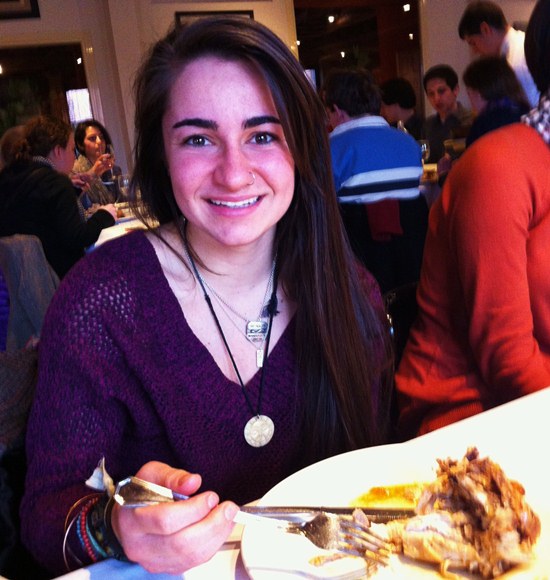Food Anxiety with a Side of Chorizo


For someone with a huge appetite, I am a picky eater. Before coming to Salamanca, I painstakingly researched common Spanish dishes and eating habits, and I was not happy with what I found. I am an adventurous eater when trying new foods. Key word: try. However, I am very conscientious of the types of foods I put in my body regularly. I will not eat white bread, whole milk, red meat, potatoes, and fried/oily foods. Guess what the staples of a typical Spanish diet are?
American culinary attitudes are polarized between incredibly health-conscious and nutritionally oblivious. My dietary habits fall somewhere in between. I try to eat healthfully and make smart substitutions (although I’m powerless against chocolate). My favorite foods are whole wheat bread, chicken, hummus, oatmeal, and fruits and vegetables. My lifestyle is very active. I play varsity field hockey at college and am always training. My homestay is with the greatest woman in Salamanca. She is kind-hearted, slightly sassy, and a wonderful conversationalist. My only problem was the food.
Breakfast the first day was a complete shock. I entered the kitchen to find cookie-biscuits, toast with jelly, and hot chocolate. People in Spain do not eat breakfast. Apparently, they eat dessert. There was more sugar in one meal than I probably eat in an entire day. Lunch was delicious, though not what I would ever imagine myself eating at home–breaded pork chops and a puree of carrots and potatoes. For dinner, my señora had microwaved some hot dogs. I don’t even eat hot dogs when I’m in the US! Other dishes include tortilla española (Spanish potato omelet) and lettuce with olive oil, mashed potatoes, and various types of embutidos (cured meats).
Food Anxiety with a Side of Chorizo.
The first week, I grappled with hunger, food anxiety, and not wanting to offend my host mom. Our host families are compensated for the expense of boarding us, but we are still at their mercy. We are also not granted kitchen privileges. I wasn’t expecting gourmet cuisine, but something grown in the ground would’ve been nice! My señora was particularly fond of (heavily) using olive oil, and she said that she almost never ate vegetables. I’m going to get rickets and die in this place, I thought. For fear of being rude, I didn’t say anything about the food. I anxiously messaged my mom: I’m starving. I’ve been surviving on coffee and gum.
I knew going into the program that I wouldn’t have control over the food, and I predicted it would stress me out this much. My program has a mandatory full-immersion policy, and the only way I could’ve lived in a dorm (and had more control over my diet) was for a medical or religious reason. It also stressed me out that I wasn’t able to work out. It was too rainy to go running most days, and I was unsure of what the gym options would be here.
I wish I could say that my reasons for worrying about the food were purely nutritional (“Am I getting enough protein and fiber?”) or athletic (“I need to stay in shape for next season!”). However, I would be lying if I told you those were the main reasons behind the food anxiety. Do you want to know what my main goal for study abroad is? To become fluent in Spanish? To travel to dozens of different cities? To make international friends? No. My one goal for study abroad: Don’t. Get. Fat.
Don’t. Get. Fat.
I have the opportunity of a lifetime, and all I can think about is how many calories must be in jamón ibérico and when I could start hitting the gym. When you come from a culture that glamorizes the “perfect woman,” everything else becomes secondary. My experience of being so preoccupied with the food (a sentiment echoed by several of the other women in the program) is indicative of how things need to change in our culture, and fast. This is a manifestation of female sexual objectification.
Objectification theory, developed by Frederickson and Roberts (1997), states that women adopt the idea of being a collection of body parts merely for the pleasure, consumption, and evaluation of others. The concept of the “looking-glass self,” explains how women internalize how others (particularly males) look at them. Such experiences are in a male-dominated society. Women assume their individual value comes from their sexual appeal and behavior, which can outpace their social, academic and athletic accomplishments.
Greenleaf & McGreer compared self-objectification between physically active and sedentary college women. Some research indicates that women who are more active are less shameful or anxious about their bodies. However, other research shows that appearance related motives for exercise were related to higher levels of self-objectification. This study found that for women who scored high on self-sexualization, their activity level didn’t matter when it came to how much anxiety they felt about their bodies. (See full reference list below.)
Being a picky eater, especially when it comes to food quality, comes with a certain degree of privilege.
Being a picky eater, especially when it comes to food quality, comes with a certain degree of privilege. The PBS documentary, People Like Us (2001), highlights class division in the US. One particular segment shows a lower-income community protesting the closing of a supermarket, which would be replaced by an organic co-op. The citizens’ main concern was how the smaller market’s artisanal quality would drive up food prices. Indeed, some whole wheat breads can costs as much as $2.50, whereas a loaf of generic white bread only costs 99 cents.
My family doesn’t belong to the free-range meat and organic produce class because it’s just too expensive. We shop at Aldi because it’s discounted and ShopRite because it’s cheaper than Wegmans, Whole Foods, Trader Joe’s, or any other “designer” supermarket. My mom religiously clips coupons and tracks sales. However, I’m blessed to say that my parents have never once struggled to put nutritious food on our table.
I cannot comment on my señora’s financial situation; quite frankly, it is none of my business. She has a beautiful, clean apartment and does not appear to be living in abject poverty. However, I do know that Spain’s economy is suffering, and people just don’t have as much extra money as they used to, according to my señora. Hosting foreign exchange students is her primary source of income. It would be unfair to make crazy grocery demands, insist on a separate menu, or force her to change her eating habits when I’m a guest in her home. This isn’t the all-you-can-eat-buffet at some health spa; it’s a middle-aged woman opening up her home. However, one glaring statement still obscured my higher-level, rational thinking: I will not sacrifice my body for this. And I hated myself for being an entitled brat.
I could care less if I leave the house without makeup or in sweats.
I could care less if I leave the house without makeup or in sweats. But looking fat? I live in constant fear of letting my body go. Being attractive (and therefore, desirable) for me has always been tied to athleticism and body shape. Don’t get me wrong, playing sports is one of my favorite things in the world. But somewhere along the way, the nine-year-old Ray who was excited to run around a sports field morphed into twenty-one-year-old Ray who anxiously checks nutrition labels and spends hours at the gym.
Getting over my food anxiety in Spain was no pasa nada in praxis. A person could only be stubborn for so long, especially when there’s spicy paella simmering on the table. Our abroad program held many seminars during orientation, and one of them was about living with your new host family. They specifically addressed the food situation. They emphasized that although you shouldn’t expect everything to be exactly like it is at home, and that your kitchen privileges are limited, you are entitled to three meals per day and were encouraged to let host families know what you do and don’t like to eat.
I surrendered hopes of eating like I do in the United States. However, after three weeks, I’ve finally found my happy medium. I eat everything my señora serves for lunch (the big meal of the day) and more often than not, I really enjoy what I’m eating. Her chorizo (pork sausage) is to die for. I just try not to think about how much I miss my mom’s cooking.
Food Anxiety with a Side of Chorizo.
My breakfast usually consists of yogurt and fruit (which, ironically, are what Spanish people eat for dessert). My señora doesn’t eat dinner because it upsets her stomach to eat at night, so she always prepares and quick-and-easy soup and salad served with cold cuts, tortilla española, or some other entrée. She also cooks vegetables for lunch a few days a week because she knows I like them. I was also able to sign up for a gym with a student discount and have been continuing my hockey training.
Studying (and eating) abroad forced me to challenge my preconceived notions about Spain’s nutrition. Surprisingly, I feel just as comfortable in my body, if not more so, since I arrived. Spain has an interesting approach to eating. They eat rich foods, but in controlled portions. They snack a lot less and rarely eat processed foods. My lifestyle is even more active than before. In addition to the gym, I walk over five miles per day between going to classes and meeting up with friends.
I regretted coming to Spain at first because I thought it would be a dietary disaster. I’m still working on my personal anxiety about body image, but this experience reinforced that the world won’t come to a screeching halt if I miss a workout or treat myself to the occasional chocolate con churros (which are definitely worth coming to Spain for).
References
Fredrickson, B., & Roberts, T., 1997. Objectification theory: Toward understanding women’s lived experiences and mental health risks. Psychology of Women Quarterly, 21, 173-206.
Greenleaf, C., & McGreer, R., 2006. Disordered eating attitudes and self-objectification among physically active and sedentary female college students. The Journal of Psychology, 140, 187-198.
Hall, P.C., West, J. H., & McIntyre, E., 2011. Female self-sexualization in MySpace.com personal profile photographs. Sexuality & Culture, 16, 1-16.
Tiggeman, M., & Williams, E., 2012. The role of self-objectification in disordered eating, depressed mood, and sexual functioning. Psychology of Women Quarterly, 36, 66-75.








